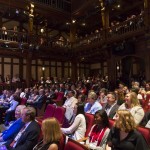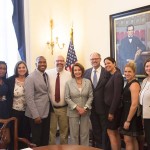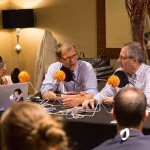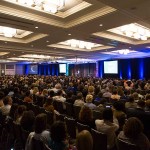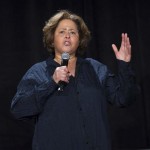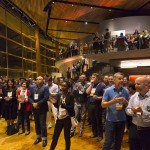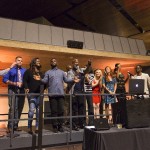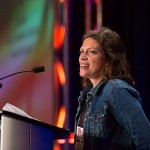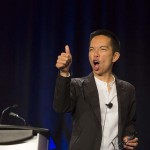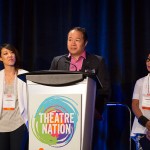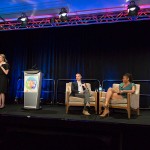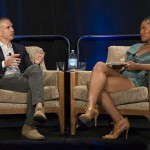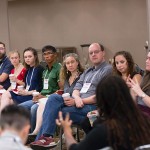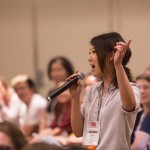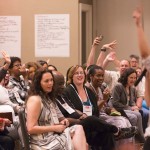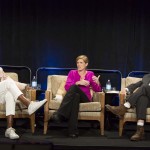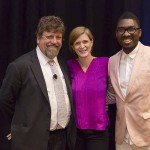As any theatremaker could tell you, the space and location where a play is performed can be as much a part of the show as any other element. That was certainly the case when theatre folks from around the globe converged on Washington, D.C., between June 22 and 25 for the 2016 TCG Conference, the organization’s 26th. Among the convening’s 1,100 attendees—a record number—the city itself was a very present attendee. While in this remarkably political year, the state of the world and current affairs would have dominated conversations no matter where the conference was held, the intersection of the performing arts and civic life in our nation’s capital during an election year was front and center throughout. Inside the Renaissance Hotel in D.C.—less than a mile down the road from the White House and two miles from Capitol Hill—discussions of past achievements, present challenges, and future hopes, both for the theatre and for the nation, took on a greater significance.
In fact, though the theme of this year’s conference was Theatre Nation, topics spanned beyond U.S. borders. The conference brought together theatre people from all points on the globe, both for a groundbreaking global pre-conference on June 22 and for the remainder of the conference proper, who joined attendees from all over the U.S. to swap knowledge, build skills, exchange strategies, and get a glimpse of D.C.’s own thriving theatre community. At the conference orientation session titled “How We Show Up,” TCG’s director of Conferences & Fieldwide Learning. Devon Berkshire, outlined the theme’s goals. “How can we use our time together to work toward a more perfect union?” Berkshire asked. “Can we imagine a Theatre Nation whose borders are not bound by walls but open through affinities of creative practice? Can we create a Theatre Nation that welcomes everyone who shares those affinities and equitably represents them?”
Shannon Musgrave, associate artistic director of Salt Lake Acting Company, said she felt welcomed. “This year’s conference felt so cohesive and timely with its theme, Theatre Nation,” Musgrave said after the week was over. “It was a great (and needed) reminder of the power of theatre to educate and unite. It felt palpable in every room—people are concerned, riled up, and ready to make change.” The Theatre Nation ideal of borderless connectivity also brought discussions back to domestic politics, where national conversation is often dominated by discussions of building walls rather than fostering community.
Community was central to the conference’s Equity, Diversity & Inclusion programming, also outlined in the “How We Show Up” orientation. This initial playbook session helped conference-goers navigate their way through the planned affinity group sessions or “At the Intersections” programs, which offered affinity space for conversations around disability, gender, race and ethnicity, sexual orientation, and national identity, with many discussions also open to allies. “We don’t have affinity space to be divisive and to separate people; we have affinity space because it is often helpful for those individuals who have been historically pushed to the margins to have a ‘for us by us’ space where their voices can be centered,” said Carmen Morgan, artEquity director and TCG’s partner in the Equity, Diversity & Inclusion (EDI) Initiative. “That is helpful in the service of coming back together again in community across identity areas and differences in solidarity to ultimately build the beloved community.”
The sessions around TCG’s EDI work were complemented with an arc of programming dedicated to the 20th anniversary of August Wilson’s “The Ground on Which I Stand” speech. The momentous address, delivered at a TCG conference in 1996, took a hard look at theatres of color and the state of the American theatre in terms of diversity—or lack thereof. Wilson’s thoughts sparked debate then and now, but unfortunately little progress has been made since he spoke: In 1996 there was just one black theatre in the League of Resident Theatres; now there is none.
Anna Deavere Smith, who moderated a discussion between Wilson and New Republic critic Robert Brustein at the Town Hall in New York City in the speech’s aftermath, spoke about the impact and legacy of the speech at the conference’s opening plenary session. Her presentation at the conference’s opening plenary mingled performance and preaching with a partial reenactment of “A Rap on Race,” a 1970 conversation between Margaret Mead and James Baldwin that had first inspired her to get Wilson and Brustein together in a room. Fast-forwarding to the present, she spoke of what she sees as a new civil rights movement “at the intersection of education and law enforcement.” With a sneak peek of her latest project, Notes From the Field: Doing Time in Education, she channeled Allen Bollock, a teenager arrested for protesting in Baltimore in the aftermath of Freddie Gray’s death.
Lastly, in acknowledgment of the political theatre that had gone on the previous night on the floor of Congress, when representatives staged a sit-in to demand a vote on gun control legislation, she performed part of a speech by Civil Rights pioneer John Lewis, the congressman from Georgia who helped lead the sit-in. The speech wasn’t about gun control but about healing and forgiveness, as he recalled meeting the white officer who’d beat him in Selma, Ala., in 1965 and accepting his apology. Concluding with the theme, “Guilt doesn’t work,” she said, “I hope that Wilson’s extraordinary essay didn’t just fill some of us with guilt, because guilt is not active.”
The “At the Intersections” sessions continued in “The Ground at 20” conversations with veteran leaders of theatres of color, who reflected on how Wilson’s speech may or may not have impacted their specific theatre. For one session, East West Players’ soon-to-be artistic director, Snehal Desai, interviewed Jorge Ortoll, artistic director of New York’s Ma-Yi Theater Company. Founded in 1989, Ma-Yi develops and produces works by Asian-American playwrights. “I certainly think that August Wilson’s speech is so powerful, heartfelt, and real, and I think that it did affect in a very good way the other non-black minority communities.” Still, Ortoll pointed out, Asian-American theatres have different challenges from black theatres, and they’re rooted in different histories. “The Asians came here pretty much on their own accord—all in search of a better life, willing. And that is the difference between August Wilson’s speech and the Asian-American theatre community.” In looking toward the future, Ortoll shared two keywords for survival, “passion” and “tenacity.” He also advised young leaders to seek advice from veterans: “Mentorship is very important. The older generation is here to push the younger generation to greater heights—and you can do it.”
Putting Success in Succession
The throughline of passing the torch to younger generations was woven within many sessions, particularly conversations about EDI. At a panel discussion titled “EDI: A Conversation About Jobs in the American Theatre,” held at Woolly Mammoth Theatre Company and co-hosted by TCG and the League of Resident Theatres (LORT), theatre leaders spoke to students, educators, and hiring managers about ways to diversify the field both onstage and in the wings. East West Players’ Desai spoke about TCG’s SPARK Leadership Program, of which he is an alum, as one way for professionals of color on the executive leadership track to gain mentorship.
For her part, Sharifa Johka at the Oregon Shakespeare Festival spoke about the theatre’s FAIR program, “a professional development program identified as a potential to assist the organization with its own aspirations of being inclusive and being diverse. There was a desire to create access points to allow people to be introduced to the institution, and for the institution to benefit from a more diverse group of people.”
Harold Wolpert, managing director of Roundabout Theatre Company, spoke about LORT’s efforts to diversify the field, with its Diversity Task Force providing education and training for organizations. TCG’s new Rising Leaders of Color Program, making its debut this year at the conference with a cohort of theatre leaders in the D.C. metro area, was represented by Amelia Powell, casting director of Arena Stage. Kwame Kwei-Armah, artistic director of Center Stage in Baltimore, offered a simple tactic that has worked for his theatre: “Just do it.” Laughs and Nike jokes aside, Kwei-Armah said that widening the pool of potential candidates for jobs, producing the works of female playwrights, and achieving gender parity for directors are feats not to be acknowledged, just done. “It starts fundamentally with board leadership empowering the executive to go out and just do it,” said Kwei-Armah. “It is not about making sure that we hold ourselves to the ideal—it’s not just about serving one demographic, but all demographics, including class.” Wolpert quoted the Guthrie Theater’s new artistic director, Joseph Haj, whom he once heard say, “When we reach the top, it is our responsibility to send the elevator back down.”
In the gender-focused “At the Intersections” track, the “Lean in American Theatre Women” session yielded more than a hundred female attendees. Conversations about advocating for each other in the field touched on the idea of mentorship, with women recounting their own female mentors in the workplace who celebrated their work early on and supported their needs on the job. Some action points decided upon included taking young girls to see plays and creating a resource website for young women to find information about fellowships, grants, and job opportunities.
On the Edge of Leadership
With the U.S. presidential election looming, leadership was a significant conference touchstone. At the second plenary session, designer and technologist John Maeda gave a presentation, “Creative Leadership: Change by Design,” that brought some levity to a topic many theatre people would prefer to avoid: money. “Money is usually taught as being evil. I’m a venture capitalist. If you’re on the spectrum of thinking that, I am in hell,” Maeda joked. He went on to share his creative approach in formerly leading the Rhode Island School of Design. When he was president of the school, he looked for innovative ways to connect to the students on a personal level.
“A traditional leader likes to sustain order, but a creative leader wants to take risks,” said Maeda. He also outlined the steps for success for creative leaders, with projected diagrams showing leaders climbing mountains, tasking risks, and regaining the stability to trek up another mountain. After sharing leadership advice, he acknowledged the power of effective leadership in the performing arts. “You may all represent an opportunity to challenge the American people to think more broadly. So I am optimistic about what we all do here; I am a believer that art can change things, and you are doing that.”
Conference attendees also lauded examples of leadership from conference organizers.
“I continue to be excited about the leadership direction that TCG is showing over the past few years in having the field address our personal and professional lives,” said Rachel Grossman, ensemble director of dog & pony dc. “It has really being exemplified at this year’s conference, and having been at the last few years’ conferences I’ve seen the arc of that journey.” Among the ways TCG addressed the intersection of personal and professional issues at #TCG16 were offering all-gender restrooms in the conference’s hotel headquarters and designating a private room for new mothers. Children were also allowed to attend, an initiative launched at the San Diego conference in 2014. “It’s so fun to see all these children and nieces and nephews—a legacy of our time in San Diego,” said Teresa Eyring at the closing plenary.
Building Bridges, Breaking Down Walls
Expanding even further beyond the idea of bringing the global theatre community together, many sessions focused on how to bring other communities into the fold of the great Theatre Nation. TCG’s first artist-in-residence, U.S. Marine veteran Maurice Decaul, led a panel titled “Blue Star Theatres: Techniques for Building Demand for Theatre in Military and Veteran Communities,” with theatre leaders from La Jolla Playhouse, the Old Globe, Trinity Repertory Theatre, and Cape Fear Regional Theatre. The discussion highlighted many initiatives, including providing workshops and theatre opportunities for active military families and veterans served by resident theatres.
The lunch salon shared the ways these Blue Star Theatres are striving to do more than simply make seats available for military community members at their theatres. San Diego’s Old Globe, for example, has created a “Behind the Curtain” weekly workshop program, which gives active service members and veterans a window on directing, sound, lighting, costume design, and more. “We give them an insight into the technical side of theatre before seeing one of our productions,” said Karen Ann Daniels, arts engagement programs manager at the Old Globe. “The effort there is to make that connection to a lot of the skills they already have, and hopefully from there we will build on finding the people who want to dig deeper in theatre and work with internships and in our shop.”
Meanwhile, dog & pony facilitated American Sign Language workshops during lunch salon sessions. Attendees learned the ASL alphabet, how to introduce themselves, and how to sign key theatre words and phrases: tickets, costumes, stage, audience. The company began these “ASL Pickups” in 2015 during the Capital Fringe Festival as an experiment, part of a special grant received by the Commission on the Arts and Humanities in D.C. The weekly pop-up series is one way of exploring the intersection of hearing and Deaf communities, explained dog & pony’s Grossman. “The purpose of the ASL Pickups was really focused on bridge building, community building, and in many ways breaking through inhibitions that hearing people have about communicating and interacting with the Deaf community.”
The Public Works program is another initiative designed to bring communities together through theatre. The program, which began in 2014 under the direction of Lear deBessonet at the Public Theater in NYC, culminated last year in an epic production of The Winter’s Tale with a cast of more than 200 New Yorkers. Taxi drivers, gospel choir singers, and senior Jazzercise groups from all five boroughs of New York joined professional performers onstage at the Delacorte Theater in Central Park. The program has now expanded across the country, with multiyear partnerships at Seattle Repertory Theatre and Dallas Theater Center, where underserved communities are gaining opportunities to participate in theatre programs, devise stories, and to perform Shakespeare onstage.
“Our communities and cities are best when everyone has the opportunity to participate,” said Kristin Gongora, associate director of institutional giving at the Public, in a breakout session devoted to the program. “The collective vision of this group is that theatre is at the heart of every community, and community is at the heart of every theatre.”
Shakespeare Theatre Company artistic director Michael Kahn, in accepting the 2016 TCG Theatre Practitioner Award, said, “I still believe that the theatre is the place where we can break down walls, we can change people’s hearts, we can change people’s minds, and we can help make our communities a better place.”
Community With a Capitol “C”
Everyone seemed to have packed their D.C. best for the conference, donning blazers, button-downs, and pencil skirts over the three days. With a historic visit to Capitol Hill on the agenda, attendees blended in with the politicians in the diamond-shaped city. On Thursday, cohorts of attendees met with representatives of Congress to advocate for the arts, just as House Democrats were wrapping up their dramatic sit-in—a performance of sorts that some conference attendees were lucky enough to catch. TCG’s Eyring described the scene at the opening plenary: “A small group of theatre people slipped away to try and see the sit-in protest for gun control on the House floor. Just when it looked like they’d never get in, a guard said that if they could assemble a group of 20 or more people, she’d bring them up. So they did what theatre people do best: They rallied a group of strangers into a community, and the sergeant of arms brought them in to witness the last 35 minutes of the sit-in.”
But some sessions revolving around politics were just part of the programming, and would have been so no matter where the conference were held. The TEAM, a Brooklyn-based theatre company that creates work about the American experience, led attendees through a session called “Devising Within a Democracy,” part of a selection of longer skills-building workshops. The workshop started with present thoughts and topics on the participants’ minds: the Brexit vote (which took place that morning), the sit-in, and the still-recent massacre in Orlando. After advising the group to put on their writer and performer hats, TEAM member Libby King led the room through a brainstorming list-making process before the group put some ideas on their feet. The session resulted in some devised moments reflective of the current American experience, both good and bad.
Meanwhile, in a special preview performance at Woolly Mammoth, where the show will have a full mainstage run Aug. 2-7, monologuist Mike Daisey gave attendees an exclusive sneak peek at his latest work, The Trump Card. Along similar themes, Daisey led a conference session titled “What to Do About Trump,” where attendees spoke about the unfortunate polarization between mainstream American theatre and most politically driven theatre. Action points, such as offering voter registration in theatre lobbies, were discussed.
Playwrights Stephen Karam and Nikkole Salter, in conversation for the third plenary, also wound up discussing politics after talking sympathetically about the craft of playwriting—or, put another way, they found that the subject of writing truthful plays inevitably leads to what they write their plays about. “I sometimes arrive at issues or very political places via the personal,” said Karam. His Tony-winning play The Humans, for instance, is framed by a backdrop of post-9/11 jitters, the lingering effects of the 2008 financial crisis, and the current toxic political cycle. Karam noted how a quote from Tony Kushner about how many canonical American plays seemingly “just” about the family are inherently political has stuck with him. “I’ll never look at Long Day’s Journey Into Night the same way,” he said.
Salter, who said she’s often inspired to write by what’s bothering her, asked Karam if he felt he had a civic duty as an artist. “When I hear the word ‘citizen,’” he said, “I do feel that it is not just my responsibility to tell the truth, but to cling to a very real kind of hope.” For her part, Salter admonished comrades and younger playwrights to “unapologetically make a contribution that is both truth-telling and immediate.”
In addition to addressing the timely current political events around the globe, TCG added last-minute sessions to address current issues within the theatre community, including a session organized around the “Not in Our House” movement formed in response to the abuse at Chicago’s now-shuttered Profiles Theatre, and a panel called “Practicing Arts Activism,” debriefing a recent controversy over racist remarks by an arts educator at an NEA meeting that led to his firing.
The Power of Theatre
Impressively, the fourth and final plenary session brought together Ambassador Samantha Power, U.S. permanent representative to the United Nations and a member of President Obama’s cabinet, and Oskar Eustis, artistic director of the Public Theater, in a conversation moderated by Center Stage’s Kwei-Armah. Power’s relationship with Eustis has allowed for many trips to the theatre, and not just as a fun night out for her fellow diplomats. Indeed, Power detailed how theatre has been for her another means of diplomacy, as she brought U.N. delegates to Fun Home and the entire U.N. Security Council to Hamilton. “My job is to maximize the means of piercing the architecture, artifice, and the automation that the institution unfortunately projects,” said Power of the U.N.
Even when she isn’t treating fellow officials to world-class theatre, she finds that the power of narrative can be a secret weapon in politics. One effort to break through has been “bringing individuals into the physical institution of the U.N. Security Council who are speaking from direct experiences,” said Power, who detailed examples of testimonials that influenced U.N. decisions on the Ebola crisis and chemical weapons attacks in Syria. “For someone in the theatre, this is going to sound so obvious—you’d think this is something that would’ve been done the last 70 years at the U.N., but kind of crazily, it hasn’t.”
Eustis recounted how, on World Refugee Day, he organized a ceremony called “Welcome Home,” using the Delacorte Theater as a kind of town hall, joining with the International Rescue Committee as a way to celebrate “the better angels of American nature,” as he put it. At the event, Homeland Security delivered the oath of citizenship to 19 new Americans from 12 countries. “This is a place where we are literalizing giving center stage to these people,” said Eustis. “It is one of the ways that we can actually take what theatre does, which is put the spotlight on people…as a way to celebrate those who are so often not celebrated.” Power ended the panel with an evocative image: “Culture can and should be the Trojan horse.”
Closing out the conference in an echo of the first day’s convening, the final day included the session “How We Move Forward,” in which affinity group leaders reported on their conversations within the “At the Intersections” sessions and offered action points to keep conversations rolling after the conference. For instance, DJ Kurs—Deaf West artistic director and TCG’s 2016 recipient of the Peter Zeisler Memorial Award—reflected on a session titled “Making Room for Deaf Artists in a Hearing Industry,” saying, “We were talking about a variety of accessibility possibilities: interpreters at every step, training the crew, hiring Deaf crew members, teaching sign language to crew members, using lighting for cues, using a visual system. And the bottom line was really that we wanted to share the message, ‘Don’t be afraid, we are here, we are your best resource, and we are here to help out.’”
SK Kerastas, who co-led a session called “Multiple Entry Points: A Space for White Folks Working Toward Racial Justice,” urged white theatre artists and allies to check out resources on Conference 2.0 to help create antiracist spaces and to dismantle white supremacy. Emilya Cachapero, TCG’s director of Artistic & International Programs, reported back about the “Intergenerational Leaders of Color” affinity group meeting. “We were in a room where we had to keep adding chairs and tables,” she marveled. “I have been doing this work a long time, and just on a personal note, I feel that I don’t need to shoulder it by myself anymore.” Ty Defoe, who previously served as TCG’s Diversity and Inclusion Fellow, concluded the session with a tribute to the indigenous people of D.C., once the land of Turtle Island, with a Native American chant as attendees joined hands and made a human chain through the room.
Observing the inspiring scene, artEquity director Carmen Morgan smiled and said, “There is a vision of the beloved community, and this is it.”



